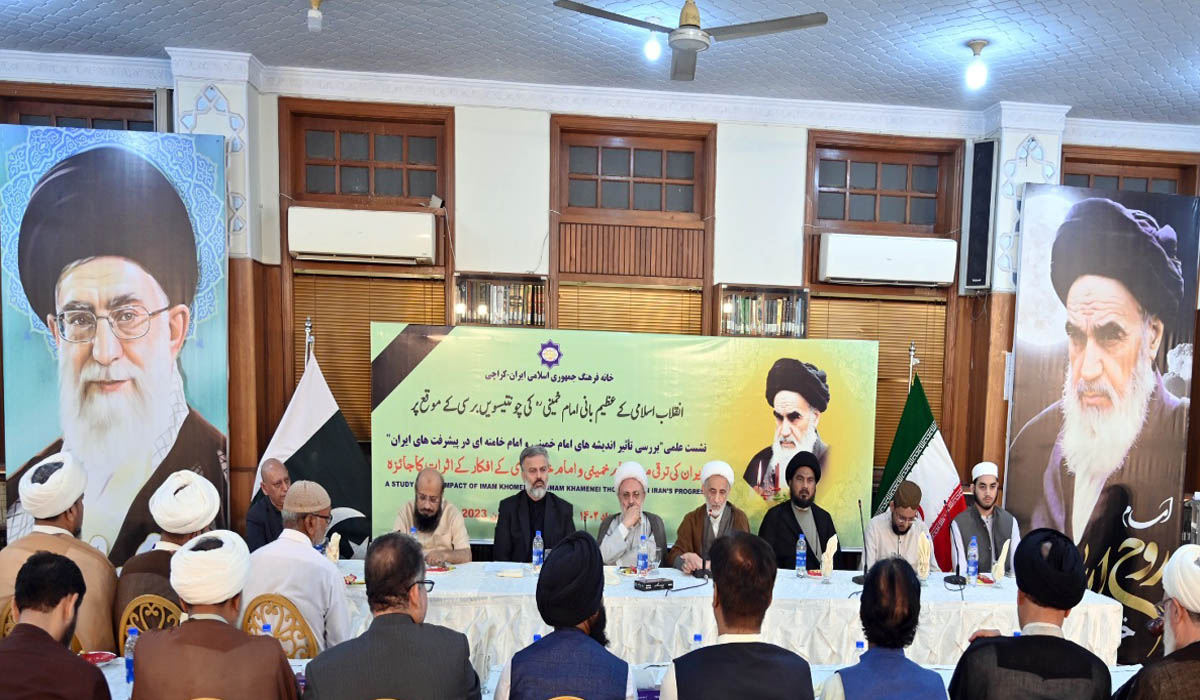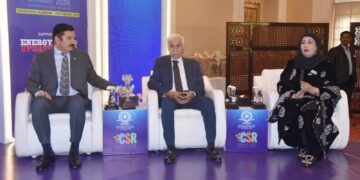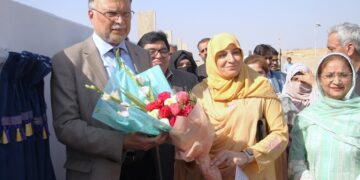On the occasion of the 34th death anniversary of Imam Khomeini, a scholarly conference was held at Iran Cultural Center Karachi. Famous Shia-Sunni scholars, spiritual leaders of other religions, heads, and professors of some govt. and private universities, political and social figures, artists, and media persons, including a large number of Imam Khomeini’s devotees participated in the ceremony.
Director Cultural Center of the Islamic the Republic of Iran Karachi, Dr. Saeid Talebinia, while speaking at the event described Imam Khomeini as the manifestation of monotheism. He added that piety, simplicity, knowledge, and the great courage of Imam Khomeini were the important factors in the success of the Islamic revolution. Referring to the Islamic revolution, he said that because of the virtues mentioned above, both the common people and scholars worldwide loved Imam Khomeini immensely.
Vice Chancellor of Mohammad Ali Jinnah University Professor Zubair Ahmad Sheikh said: Imam Khomeini was a leader who gave special importance to the universities. Imam Khomeini told the professors of the universities to prepare the young generation so that they do not think of themselves as Westernized, but instead use their talents for the advancement of the Muslim nation. It is important to convey this message to the youth of the Muslim community. Zubair Sheikh added: Today, Iran has been included in the rank of developed countries of the world, and this is due to the leadership of Imam Khomeini.




Dr. Mahdavi Maher, professor of Al-Mustafa University in Qom, said: Imam Khomeini always stressed on freedom of the oppressed people from the oppressors of the world. He added; when the Imam used to give a statement in favor of humans, his audience was not merely common Iranians, but all the oppressed people of the world. He never talked in favor of any particular religion, sect or ethnicity, he always talked about humanity.
Dr. Shams Hamed, the dean of the Faculty of Social Sciences at Iqra University said: Imam Khomeini was a scholar, jurist, and a great revolutionary leader of the world. Imam Khomeini was like Allama Muhammad Iqbal, a great reformer of the Islamic Ummah, with the difference that Imam Khomeini got the opportunity to make a massive change in Iran. Imam Khomeini tried to enforce the message of monotheism through his reforms in Iranian society. Dr. Naseem Zaidi, principal of Jamiat Al-Mustafa Karachi, said: Imam Khomeini sent his message through his revolutionary struggle to the Iranian nation and all Muslim people of the world that it is not impossible to counter any so-called superpower in the world; and no doubt, he learned this lesson from Imam Hussain.
Dr. Uzair Mahmood Al-Azhari, the Director of the Al-Azhar University Branch in Karachi, said: Imam Khomeini was such a jurist, freedom fighter, and spiritual leader that he was never afraid of oppressors. Imam Khomeini gave this message to every nation that if you want a revolution, you will have to stand against oppression and suffering. He followed Imam Hussain to the extent that Allah’s pleasure was included in his struggle, which resulted in a certain victory.
In the last part of this conference, an Urdu translation of a book written about the life history of Imam Khomeini was inaugurated. In this book, some parts of Imam Khomeini’s family life have been presented in the form of stories.


















